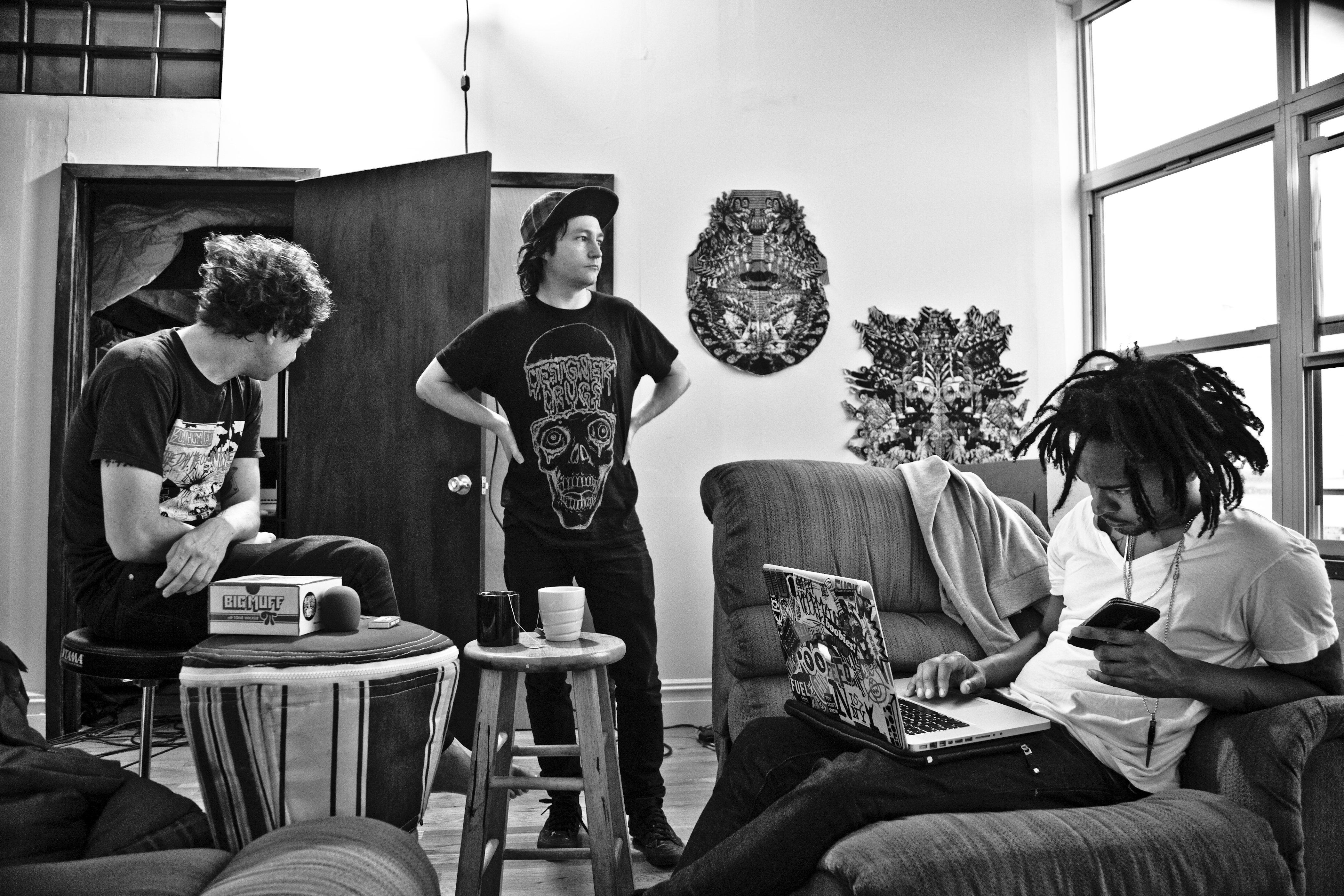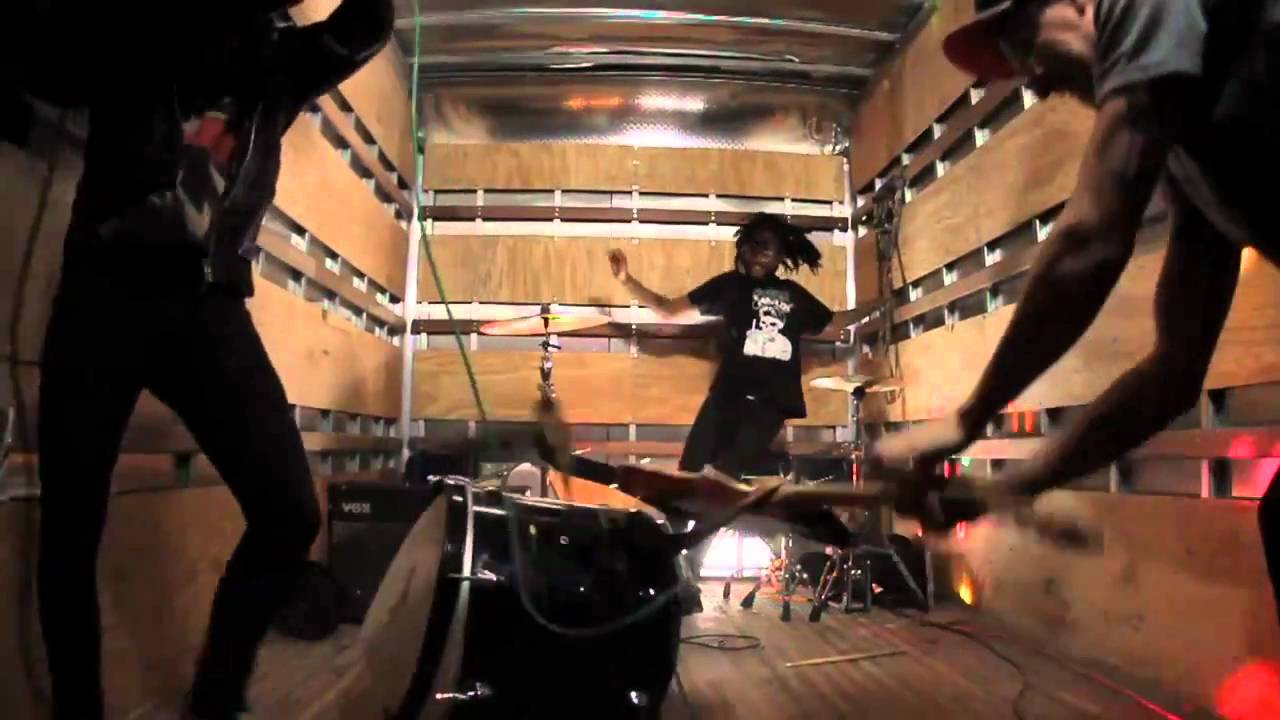In September 2009, just as The Death Set were about to start writing material for their second album, founding member Beau Velasco – who had fought drug addiction throughout his adult life – died of an overdose. After some painful soul-searching, singer/guitarist Johnny Siera decided that the band should continue, and that the new songs would be a celebration of his friend’s life.
The resultant album is the brilliantly debauched Michel Poiccard. Produced by XXXChange and featuring, amongst others, his hip hop project Spank Rock, the record is a noradrenaline rush of punk, thrash metal, funk and rap. It sounds like the Beastie Boys fronted by a punk rocker. When Michel Poiccard opens with a four second sample of Beau’s voice – "I wanna take this tape and blow up ya fuckin’ stereo" – it reveals both the perfect mission statement and a fitting epitaph.
Indeed, whether being sampled (on the touchingly silly ‘Is That A French Dog?’) or via moments of profound and unsettling lyrical reflection, the presence of Velasco seeps into every note on the album. The bluntly-titled ‘I Miss Beau Velasco’ is a beautiful swirling dirge, with Siera’s vocal ("Staring at the end of you") swept away on a tide of reverb, while the album closes with the (relatively) straight-bat rock of ‘Is It The End Again?’ containing the heart-wrenching couplet of "I thought we’d overcome / 15,000 miles, several dreams, every obstacle imaginable."
Formed in 2005 when Siera met Velasco in their hometown on Australia’s Gold Coast, The Death Set moved to America, and threw themselves into the Baltimore punk scene. Their debut album Worldwide showcased a furious car-crash of DIY punk – or "short, snotty, fast songs that would make kids in a warehouse go crazy," as Siera tells me. Just as the album began to create a global underground notoriety, the death of one half on the band’s creative force found could well have ended The Death Set as a musical entity. Siera was devastated by the loss of Velasco and unwilling to talk about him during interviews. However, after agreement on some basic ground rules, he agreed to answer a few questions relating to Beau and why The Death Set had little choice but to record Michel Poiccard.
Everyone at The Quietus was incredibly saddened to hear about Beau’s death. Many thanks for agreeing to talk to me about what must be a very difficult subject for you.
Johnny Siera: It’s fine – as long as everything you write about him is focused about the music, and not about how he died.
Of course. You met Beau back in 2005, what was it about him that connected with you?
JS: We come from this shitty little town called the Gold Coast. It is full of beaches and surfers. There is not much focus on anything intelligent. If anyone was in the music scene, it tended to be left of centre and everyone pretty much knew each other. That is how the three of us – [guitarist] Dan [Walker], Beau and myself – met. We just got onto each other about making something fucking rad. We moved to Sydney and then took it to the next level.
From Sydney you relocated to Baltimore. That’s not perhaps an obvious place to emigrate to – what was it about that particular city?
JS: Actually, we first went to Brooklyn for about four or five months. Our friend [DJ and producer] Emily Rabbit helped us out from even before we moved to Baltimore. We had nowhere to go and nowhere to stay in Baltimore – the typical moving to a big city kind of story. She offered for us to live in her basement for a while until we got on our feet. At the time, there was a really, really crazy gig scene, with bands like Beach House and Double Dagger. If you have five or six proactive bands next to an art school, coupled to artists’ warehouse space, it is a really great equation for a scene.
Your debut album proper (Worldwide) was released in 2008. Looking back, how do you feel about the record?
JS: I think the songs are really great on the album. I guess the fidelity stopped a lot of people listening to it, but, fuck it, I’m glad we kept it like that. I was a little annoyed when bands with a low fidelity became valid a couple of years later, to be honest. But, whatever, it was the vehicle that allowed us to keep writing music and playing music.
By 2009, The Death Set seemed to have gained a real momentum. Were you at all surprised by the response you were getting around the world?
JS: I was definitely surprised – we were playing shows to 20 kids and then playing the Fuji Rock festival to six thousand people. That was never the intention of the band. The intention of the band, at that time, was writing these short, snotty, fast songs that would make kids in a warehouse go crazy. For the rest of the world to jump on it was really great. It was amazing; I’m not going to lie.
How close were you to disbanding The Death Set in the period after Beau died?
JS: I definitely thought about it. I think it would have been easier for that to happen. I guess we were really faced with two choices, and one of the choices was to finish the band and it ends in sadness, or keep going and try and make the record a celebration of who he was. He had an influence on people which was so immense in so many different areas, and not just music. He was a general little catalyst for a lot of people to start what they were doing, which is what he essentially did with The Death Set.
And so this was the reason to carry on?
JS: Yes, The Death Set has always been about positivity and having a good time and living for the now. We had a period of time to think about that – and carrying on was the only real decision we could make.
So how did you go about creating Michel Poiccard? It must have been an immensely difficult record to make?
JS: Well, there are a lot of songs that are dealing with Beau’s death. I think a lot of Death Set songs, even on the last record, have been about being in a bad place and essentially writing the song to get to that better place – putting things in perspective by holding them at arm’s length, in a way. That’s what songwriting lets the songwriter do. So, even though some of the songs were about his death, they were still trying to see the positive side and understand it; to try and get a grip on the whole situation. If you ask me if it affected the record, then 100 per cent, of course it did. But, if a song wallowed in the sadness of it, we tried not to let that happen – we tried to flip that into something positive.

Sonically, Michel Poiccard seems more refined and expansive that your previous work. What was your vision for how you wanted the music to sound?
JS: So, first of all, we wanted to step up the production and [by working] with XXXChange we had that in mind. We didn’t want to be locked into the same lo-fi category as the last record. I fucking love lo-fi music still, but over the last couple of years it has become it has become a little bit of a trend and a little bit saturated. Also, I’d like to think that the songwriting was gaining a bit more depth. It would have been a whole lot easier to just fucking write one-minute punk thrash songs and I still love that. But, we also had other styles that were coming out naturally during the recording process. It was a scary thing to try and do those styles but I am glad that we did it. I’d like to think that the listeners aren’t so stuck in one style of music and they can appreciate a record of varying styles. I love listening to old Beastie Boys records, where they would go to a funk-jam after a hip-hop song. Overall, the album is definitely a move forward for our sound.
Hip hop seems to be a huge source of inspiration on this album, perhaps more than before. Do you agree?
JS: It’s interesting you see it that way. Of course, the influence of hip hop has definitely come across in the use of sampling and the production values. But, I’ve always said that the three influences for The Death Set have been punk rock, electronic music and hip hop and that was true for the first record as well.
You mentioned that XXXChange (Alex Epton) produced the new album – why did you choose to work with him?
JS: When we were looking for a producer, we weren’t looking for a typical rock producer. That’s not The Death Set – we’ve always been a little more fucked-up. So, the fact that he is a genius electronic producer was great. But, I stayed on Alex’s floor on the first night I was in America, so he had known about The Death Set. He really understood what we were about, which was really important. We were completing the circle when it came to working with him.
There are several songs that seem to specifically deal with Beau’s death. Even though your vocals are quite low in the mix, there is no doubting the sentiment behind the track ‘I Miss Beau Velasco’. It is a beautiful piece of music and, perhaps, my favourite song on the album – but how do you go about creating a song to convey such a personal feeling?
JS: Thank you; it’s my favourite too, actually. When we first wrote it, I was never confident that it could be a Death Set song. It was originally going to be an interlude and Alex pushed us into realising it as a song.
I was also thinking about the album’s final track (‘Is It The End Again?’) which seems to provide an incredibly vivid insight to your relationship with Beau.
JS: You’ve mentioned the two songs that we were most petrified about. To be honest, those two songs came off my chest very naturally. It was scarier to actually put them on a Death Set record. But, you know what? I am glad we did, because, fuck it, it is what came out in that period of time.
But, conversely, the album contains a short track entitled ‘Is That A French Dog?’ which is hilarious. The song contains Beau’s voice – how did it come about?
JS: Yeah, that was actually a really old sample of Beau. Dan searched through a whole pile of discs and eventually found this little monologue on a file. Essentially, we wanted to have Beau’s input on the record as much as possible. It also comes back to us not being scared to experiment, but personally, for that song it was more about having Beau on the record and try and have a bit of his personality shine through.
These songs were created under extremely difficult circumstances – you must be very proud of them?
JS: Me personally? Yeah, I am and it has taken a lot to feel like that. I think I am proud that we went through with the realisation of those songs.
As time has passed, have you found yourself factoring in what ‘Beau would have wanted’ when you were making decisions for the band?
JS: Hmm. I think it is impossible to think what he would want. I know he would have wanted Dan and I to keep writing music – I know that much. When it comes to the reality of the situation, it didn’t feel right to quit. For me personally, it would have felt like we were giving in. I don’t want what happened to be what the band is about.
Michel Poiccard is a character from the Jean-Luc Godard film, À Bout De Souffle. What was it about the character which resonated with you?
JS: The inspiration was just the fact that girls always fall for the bad boy. He’s such a rough-and-tumble, lady-killer type of bad boy – he’s an amazing character. When we when we were searching for an album title, it became a little more relevant as to what the band is.
Finally, how much did the creation of Michel Poiccard help you personally through the grieving process?
JS: A lot, I suppose. I have spent a lot of time with his Mum and Dad, and I definitely know that they don’t want him to be forgotten. So, to have his input on the record is very important to me. The thing that makes me crazy sometimes is that people could ever think that we are exploiting this terrible situation. All I can say is that our intentions are pure – we wanted to celebrate him and this is the only way we knew how to do that.




